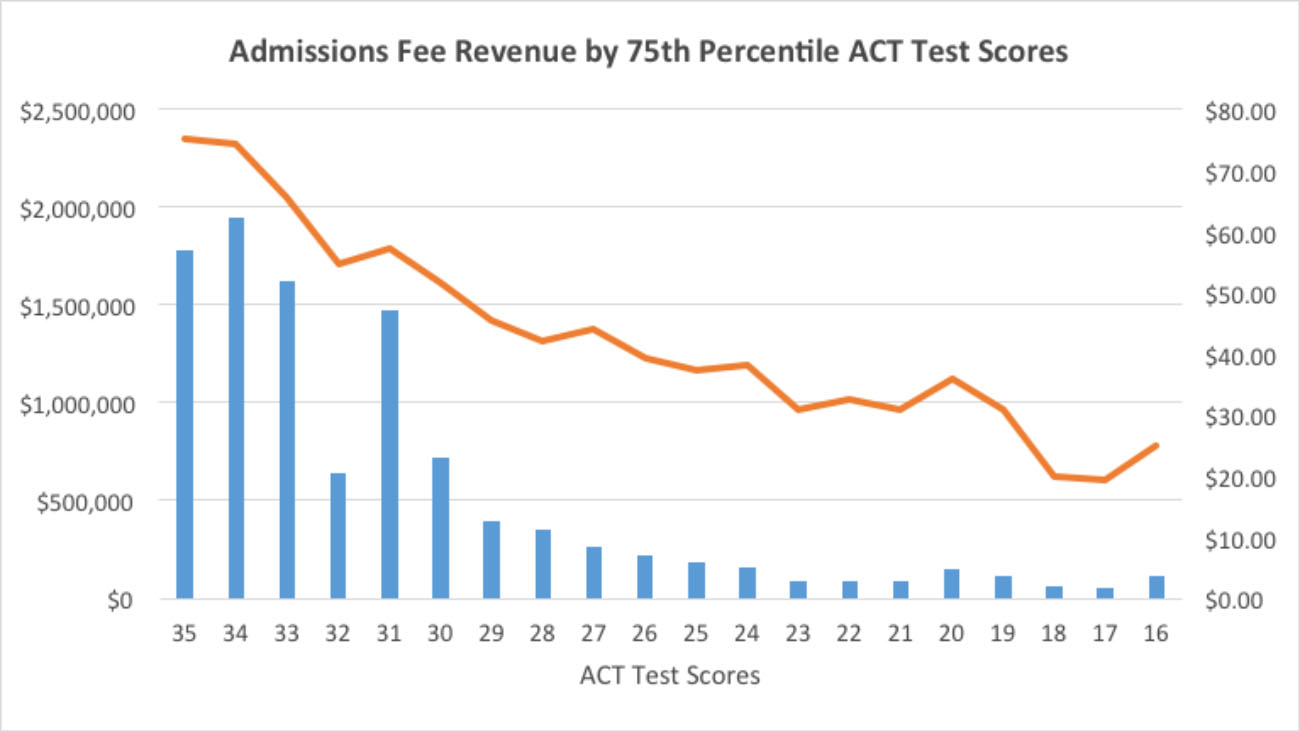
Students spent an estimated $470 million on application fees for undergraduate admissions in 2026, based on data from Integrated Postsecondary Education Data System (IPEDS). The IPEDS data shows a total of 10,055,109 applications for admission and a weighted average application fee of $46.70.
About half of application fee revenue, $229 million, is spent by students whose applications are rejected. If current trends continue, the total annual spending on application fees is in excess of half a billion dollars.
How to Cut Application Fee Costs
Students can reduce their application fee costs with these tips:
- Limit the number of applications submitted to reduce application and test score fees
- Seek application fee waivers if you are eligible
- Use free application platforms, such as the Cappex Application and Greenlight Scholars Application
Demographic Analysis of Application Fees
Additional insights from the IPEDS data include:
- $210 million in fees was from males and $259 million was from females
- $279 million in fee revenue went to public schools, an average of $434,376 per school
- $188 million in fee revenue went to private, nonprofit schools, averaging $156,451 per school
- Fee revenue received by private, for-profit colleges was $2 million
- Application fees from Pell Grant recipients was $138 million, or 29% of the total
- Application fees from minority students are about $153 million, or 33% of the total
- Application fees increased from $178 million in 2001 to $252 million in 2005 to $470 million in 2015
Selective Schools Charge Higher Application Fees
Schools that accept less than 20% of their applicants receive an average of $1.27 million per school, compared with $155,619 per school among those that accept 40% or more of applicants. The average application fees are $62.12 and $30.52, respectively.
This chart shows admissions fee revenue by selectivity, demonstrating that the most selective schools charge twice the application fees of less selective schools.

A similar result occurs with admissions test scores. Higher ACT test scores correlate with higher application fees and higher total application fee revenue.
The average application fee is $74.73 for schools with a 75th percentile ACT test score of 34 or more, compared with $30.62 for a 75th percentile ACT test score of 21 or less.
Need Information or Confused about Something ?
Ask a Question
Did You Know : Top 15 Free Online Learning Platforms
-
Free Online Education Degrees : Coursera:
Coursera partners with universities and organizations worldwide to offer a wide range of courses. While many courses are free, a fee is often required for certification.
-
Free Online Education Degrees: edX:
Founded by MIT and Harvard, edX offers high-quality courses from top universities and institutions around the world. Certificates are available for a fee.
-
Free Online Education Degrees : Khan Academy:
Khan Academy provides free educational content in various subjects, especially mathematics and science, using instructional videos and practice exercises.
-
Free Online Education Degrees : Udacity:
Udacity focuses on tech-related courses and nanodegree programs, offering free content as well as more in-depth paid programs.
-
Free Online Education Degrees : MIT OpenCourseWare (OCW):
MIT OCW provides a vast array of MIT's course content for free, covering a wide range of disciplines.
-
Free Online Education Degrees : Harvard Extension School:
Harvard Extension School offers a selection of free online courses. While some courses are free, others may require payment for a certificate.
-
Free Online Education Degrees: Stanford Online:
Stanford Online offers a variety of free courses in different disciplines, including computer science, engineering, and business.
-
Best Free Online Courses : Carnegie Mellon Open Learning Initiative (OLI):
OLI offers free online courses and resources designed to improve learning outcomes through research-based methodologies.
-
Best Free Online Courses : FutureLearn:
FutureLearn partners with universities and institutions to offer a diverse range of free online courses. Certificates are available for a fee.
-
Best Free Online Courses: Alison:
Alison offers a wide range of free online courses, including diploma and certificate programs, covering various subjects.
-
Best Free Online Courses: Open Yale Courses:
Yale University provides free access to a selection of introductory courses through Open Yale Courses.
-
Best Free Online Courses : UC Berkeley Online:
UC Berkeley offers free online courses on a variety of subjects, ranging from computer science to humanities.
-
Best Free Online Courses : Google Digital Garage:
Google Digital Garage provides free courses on digital skills, including online marketing, data analysis, and more.
-
Best Free Online Courses : Codecademy:
Codecademy offers free coding courses, interactive exercises, and coding projects to help individuals learn programming languages.
-
Best Free Online Courses : LinkedIn Learning (formerly Lynda.com):
LinkedIn Learning provides a variety of video courses on professional development, technology, and creative skills. It offers a free trial period.